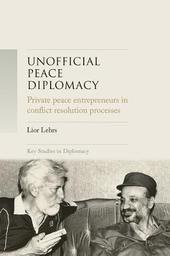
|
Unofficial Peace Diplomacy: Private Peace Entrepreneurs in Conflict Resolution Processes
Hardback
Main Details
| Title |
Unofficial Peace Diplomacy: Private Peace Entrepreneurs in Conflict Resolution Processes
|
| Authors and Contributors |
By (author) Lior Lehrs
|
| Series | Key Studies in Diplomacy |
|---|
| Physical Properties |
| Format:Hardback | | Pages:304 | | Dimensions(mm): Height 234,Width 156 |
|
| ISBN/Barcode |
9781526147653
|
| Classifications | Dewey:303.66 |
|---|
| Audience | | Tertiary Education (US: College) | | Professional & Vocational | | General | |
|---|
| Illustrations |
12 black & white illustrations
|
|
Publishing Details |
| Publisher |
Manchester University Press
|
| Imprint |
Manchester University Press
|
| Publication Date |
4 October 2022 |
| Publication Country |
United Kingdom
|
Description
The book analyses the phenomenon of private peace entrepreneurs - citizens with no official authority who initiate dialogue channels with official representatives in order to promote conflict resolution. The research combines theoretical discussion with historical analysis, examining four cases from different conflicts. This book analyses the international phenomenon of private peace entrepreneurs. These are private citizens with no official authority who initiate channels of communication with official representatives from the other side of a conflict in order to promote a conflict resolution process. It combines theoretical discussion with historical analysis, examining four cases from different conflicts: Norman Cousins and Suzanne Massie in the Cold War, Brendan Duddy in the Northern Ireland conflict and Uri Avnery in the Israeli-Palestinian conflict. The book defines the phenomenon, examines the resources and activities of private peace entrepreneurs and their impact on the official diplomacy, and examines the conditions under which they can play an effective role in peace-making processes.
Author Biography
Lior Lehrs is a Research Fellow at the Leonard Davis Institute for International Relations at the Hebrew University of Jerusalem -- .
Reviews'There are plentiful accounts of official attempts to resolve such serious clashes as the US-Soviet rivalry, the conflict in Northern Ireland and the Israeli-Palestinian conflict. Much less well-known are non-official endeavors that laid the foundation for these efforts. Lior Lehrs has captured the stories of four remarkable people who as private peace entrepreneurs (PPEs) reached out - often at great risk - to the other side to establish critical lines of communication and trust that made further talks possible. The sagas of the peacemaking efforts of Norman Cousins, Suzanne Massie, Brendan Duddy, and Uri Avnery make for compelling reading in their own right but they are made even more meaningful by Lehrs' careful analysis which imbeds the PPEs' actions into major theories of negotiation, mediation and conflict resolution. A terrific resource for students, scholars and practitioners in the field of peacebuilding, as well as for anyone who is interested in the capacity for individuals to promote change.' Pamela Aall, Senior Advisor for Conflict Prevention and Management, US Institute of Peace 'Scholarship has been blind to the role of private individuals in opening channels of communication between adversaries and reducing conflict. Lior Lehrs sets the record straight with good theorising and important case studies. This account is as fascinating as it is important.' Robert Jervis, Adlai E. Stevenson Professor of International Politics, Columbia University 'Fascinating stories about people who made peace as individuals while officialdom was stymied. At a time when conflict management and resolution are rare skills in a troubled world, some enterprising, knowledgeable intervenors operating privately could learn more from this book about how to improve their chances and overcome their obstacles.' I. William Zartman, Jacob Blaustein Distinguished Professor Emeritus of International Organization and Conflict Resolution, The Johns Hopkins University-SAIS, Washington 'Lehrs' book is very valuable in itself: it is to be hoped that his careful approach of sifting and considering the specific skills, approaches and choices of his subjects will be developed further and more widely applied (both by Lehrs himself, and by others) so as to construct a systematic taxonomy of the many diverse forms of peace-activism and efforts to manage, resolve and transform conflicts.' Mike Makin-Waite, Process North -- .
|